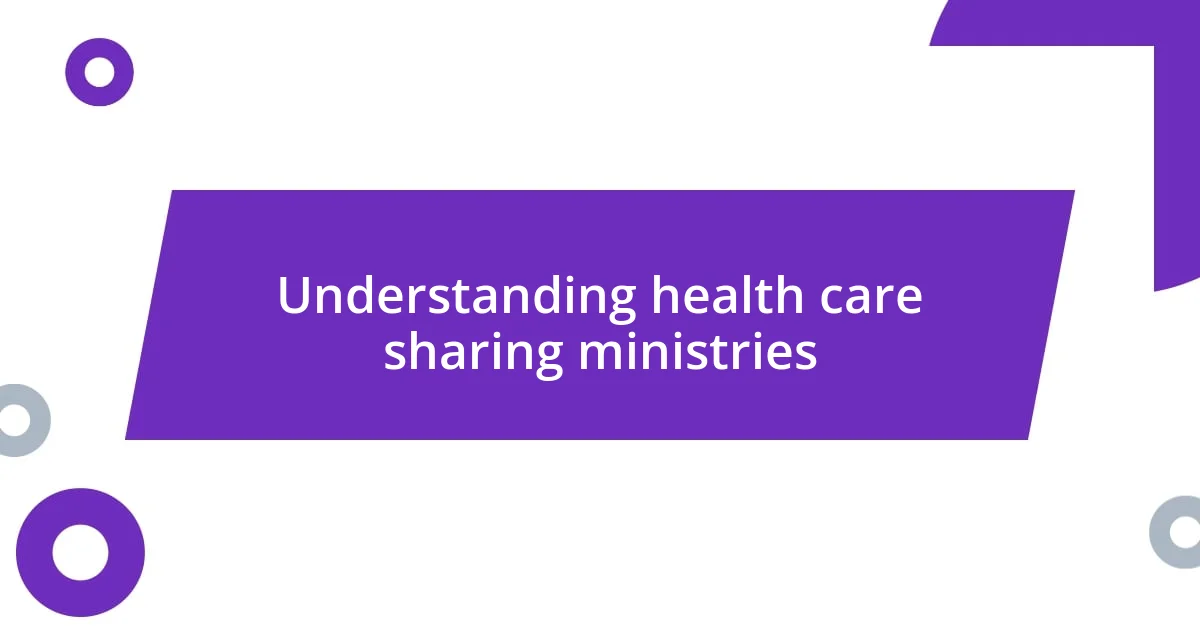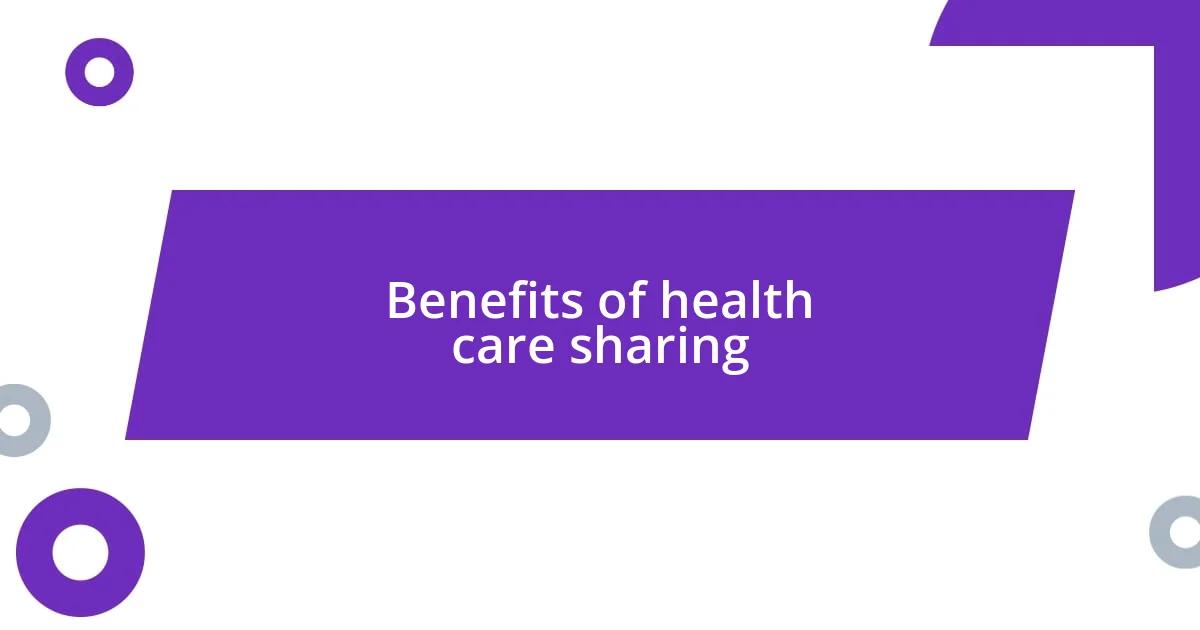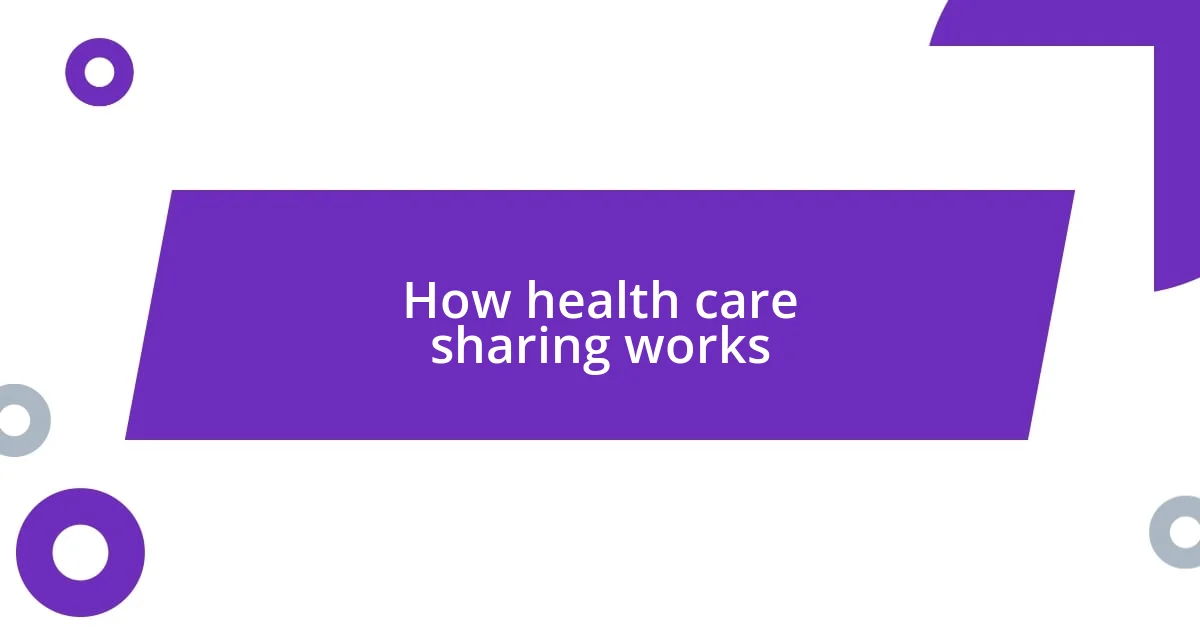Key takeaways:
- Health care sharing ministries (HCSMs) provide an alternative to traditional insurance, promoting a community model where members support each other with medical costs.
- Key benefits of HCSMs include lower costs, flexibility in healthcare choices, emotional support, value-driven care, and transparency in fund allocation.
- HCSMs operate through a collaborative model, enabling members to share medical needs and expenses while having specific guidelines on coverage and cost-sharing.

Understanding health care sharing ministries
Health care sharing ministries (HCSMs) are innovative alternatives to traditional health insurance. In my experience, these ministries operate on a community model where members support each other by sharing medical costs. It’s fascinating to see how, within these groups, members often form relationships that go beyond financial support, fostering a sense of belonging.
I remember the first time I learned about HCSMs; it felt like a revelation. Instead of paying premiums to a faceless company, I could join a network of like-minded individuals who shared my values and beliefs. Have you ever considered being part of a community that genuinely cares about your health and well-being? It’s a refreshing change to think of health care as a communal effort rather than just a transaction.
Members typically contribute a monthly share, which then gets pooled together to help cover medical expenses. This model often inspires trust and solidarity, but it does raise questions about how effective it can be when the need arises. Personally, witnessing the stories of families receiving help during difficult times has driven home the idea that health care can be more about compassion than just dollars and cents.

Benefits of health care sharing
One significant benefit of health care sharing is the strong sense of community it fosters among members. From my own experience, being part of a group where people genuinely care for each other’s well-being is incredibly uplifting. I vividly recall a time when a friend in our ministry faced a significant medical emergency. The outpouring of support from other members was overwhelming; it was as if we were all one big family working together to lift someone up during a challenging moment.
The advantages of health care sharing ministries include:
- Lower Costs: Typically, members pay lower monthly contributions compared to traditional insurance premiums.
- Flexibility in Choices: Many HCSMs allow for more personal choices regarding healthcare providers and treatment options.
- Supportive Network: There’s an emotional safety net as members share not only finances but also prayers and encouragement during medical challenges.
- Value-Driven Care: Members often align in their values, making decisions about healthcare that reflect their beliefs.
- Transparency: With clear guidelines on how funds are allocated, members can see where their contributions go, fostering trust.
It’s refreshing to witness how these ministries can reshape our approach to health care, emphasizing compassion rather than mere transactions.

How health care sharing works
Health care sharing operates through a collaborative model where members contribute a monthly share to a common pool. I’ve seen firsthand how these contributions are then used to cover eligible medical expenses for fellow members. It’s like being part of a caring village; when someone faces a medical challenge, the collective funds step in to help, reminding me that we are really in this together.
As members, we communicate openly about our medical needs, which I find incredibly empowering. I recall a time when a close friend required surgery and the moment his need was shared, the response was immediate and inspiring. Members rallied together, and within days, a significant amount was gathered to help him, highlighting the power of community support. Have you ever faced a daunting health issue and wished for an army behind you? This sense of unity truly transforms the stressful experience into something more manageable.
Importantly, health care sharing isn’t without its guidelines and limitations. Each ministry has specific rules about what is covered and how costs are shared, which can vary significantly from one group to another. I remember feeling a bit apprehensive when I first joined; understanding the specifics of what was included felt daunting. But once I grasped how the sharing system worked, that initial fear gave way to confidence. Isn’t it reassuring to know that you have a safety net as you navigate the often unpredictable world of healthcare?














